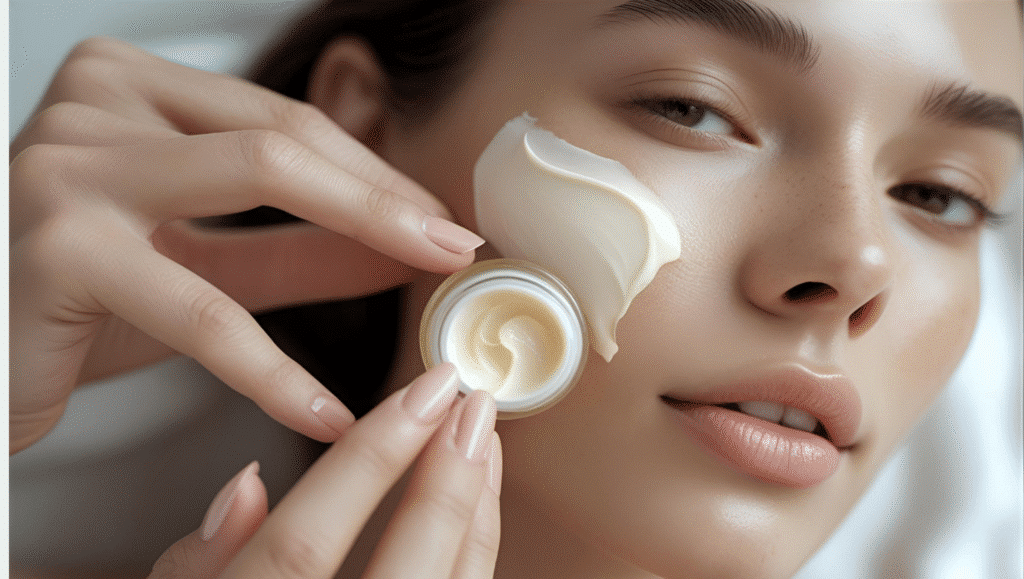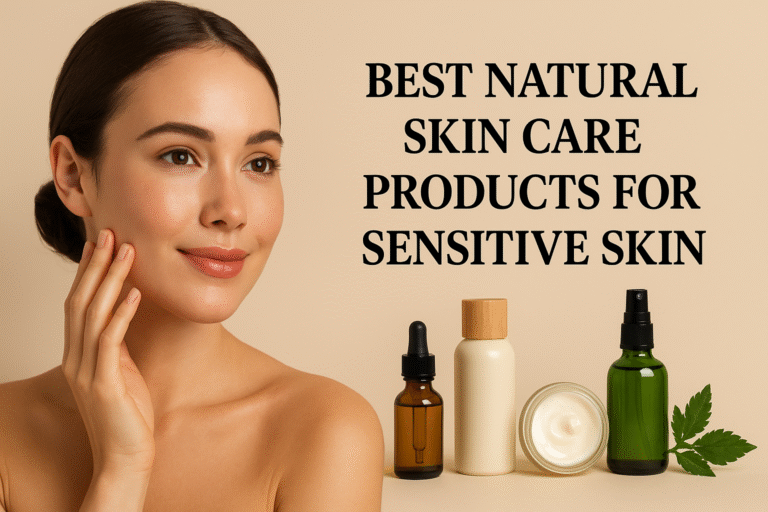introduction: Natural Skin Care Products for Sensitive Skin
Sensitive skin is like a moody best friend—sometimes calm, sometimes irritated, and almost always unpredictable. If you have ever tried a new moisturizer and have eliminated red face within hours, you know the struggle. Finding products that actually work without triggering a response is no easy task. This is the place where this guide is a step.
In a world filled with skincare solutions, it is difficult to know what is really safe for delicate skin. Many products shout “natural” on their labels but still have rigid material hidden under complex chemical names. So what is the real deal when it comes to the best natural skin care products for sensitive skin?
________________________________________
Table of Contents
Sr.# Heading Title
1. Understanding the Sensitivity of Skin
2. Why natural skincare is ideal for sensitivity
3. ingredients to hug and escape
4. Cleaning: The First step for healthy, sensitive skin
5. Toner and Mists: Hydration without irritation
6. Moisturizer: Barrier Builders
7. Natural Serum and Treatment
8. Face masks: cool, cool, and rejuvenation
9. Sunscreen: mineral-based for maximum comfort
10. Makeup for sensitive skin: clean and soft
11. Haircare that does not harm your skin
12. Creating your skincare routine
13. Tips to avoid provoking
14. to detect reliable natural brands
15. Lifestyle habits that improve skin sensitivity
16. Skincare Reading Label Like an Expert
17. When to see a dermatologist
18. Last Idea: Embrace your skin naturally
1. Understanding the Sensitivity of Skin
Sensitive skin is more than just a problem for beauty. This is a daily struggle. People are sensitive skin often face redness, dryness, or irritation. especially when they are trying new skincare products. These reactions usually stem from a weak skin barrier that cannot effectively protect against environmental stresses and rigid materials.
Identification of sensitive skin begins with awareness: Do your products often irritate?
Does your skin react to the sun, air, or warm water? If yes, gently require helpful care; do not challenge using products designed to calm your skin specifically.
2. Why natural skincare is ideal for sensitivity
When your skin is sensitive, it is less. The natural, plant-based skincare focuses on non-agitated materials that support the natural remedies and protection mechanisms of the skin. Natural products—synthetic dyes, free from parabens and sulfates—reduce the risk of irritation. Unlike traditional formulas relying on artificial chemicals, natural skincare usually knows your skin, such as plant oil, vegetation extracts, and floral water. They are more skin-compatible and reduce allergic reactions and long-term damage.

3. ingredients to hug and escape
Ingredients to hug:
• Aloe Vera—Soothes and Hydrates
• Chamomile—calms inflammation
• Calendula—fixes redness and reduces
• Shea butter—Nourishes deeply without holes
• Jojoba oil balances is sebum and non-comedogenic
Material to escape:
• Alcohol (deprived)—dries and bothers
• Synthetic aroma—a major allergen
• Sulfates – Strips of natural oils skin
• Parabens—Hormonal is associated with disintegration
Always read the component list and patch-test new products before full use.
4. Cleansing: First Step to Healthy Sensitive Skin
Cleansing sets the tone for your entire skincare routine. But hard cleansers can strip sensitive skin, which can cause tightness and irritation.
For cream-based or oil-based cleansers made with soothing materials such as oat extract or sunflower oil. They become purified without disrupting the moisture barrier of your skin.
To avoid over-washing, stick to cleaning once a day. In the morning, a splash or light toner of water may be sufficient.
5. Toner and Mists: Halid without irritation
Forget the toner filled with alcohol of the past. Today’s natural toner is designed to hydrate and calm without stripping.
Go for alcohol-free formulas with rose water, witch hazel (without alcohol), or cucumber extracts. Facial mists with lavender or chamomile are excellent for afternoon refreshers, which immediately calm the skin.
Toners prepare your skin for moisturizer and serum, absorbing the serum.
6. Moisturizer: Barrier Builders
A strong moisture barrier is necessary for sensitive skin. Moisturizers lock in hydration, seal the irritable, and help in repairing damaged skin.
Choose products with:
• Ceramides—Restore skin’s natural lipids
• Colloidal Oatmeal—Reduces itching and redness
• Squalane—Natural skin oil mimics
7. Natural serum and treatment
There are serum-centered treatments that distribute deep nutrients in the skin. For sensitive skin, the right serum can calm inflammation and support long-term skin health.
Try with serum:
• Vitamin C (low concentration)—gently brightens
• Niacinamide—Reduces redness and strengthens the skin
• Hyaluronic acid—hydrate without heaviness
Use serum at night, starting 2-3 times a week. If your skin loves it, then gradually increase frequency.
8. Face Mask: Cool, Calm, and Rejuvenation
Face masks provide intensive care, but not all are safe for sensitive skin. Avoid earthen masks that dry up the mask that tugs or peels on your skin.
Instead, choose hydrating and cool masks made with honey, aloe vera, or oat milk. These provide moisture and reduce inflammation without harsh reactions.
Use it once a week to treat your skin; it will like it.
9. Sunscreen: mineral-based for maximum comfort
Sun protection is nonpareil, especially for sensitive skin. Chemical sunscreens can cause pricks and irritation due to their UV-absorbed material.
Opt for mineral sunscreen with zinc oxide or titanium dioxide. They create a physical barrier on the skin and are less likely to cause feedback.
Look for items that say “broad spectrum” and have an SPF of 30 or more. Bonus if they contain hydrating materials such as glycerin or shea butter.
________________________________________
10. Makeup for the Natural Skin Care Products for Sensitive Skin: clean and soft
Makeup can be a difficult area for sensitive skin. Many traditional makeup products are loaded with artificial dyes, aromas, and preservatives—all of which can cause breakouts or irritation.
Instead, select the option of clean, mineral-based makeup that uses natural pigments and releases harmful chemicals. See “non-comedogenic,” “fragrance-free,” and “ready for sensitive skin.”
Brands such as RMS Beauty, Alima Pure, and Lily Lolo provide foundation, blush, and eye makeup options made of natural ingredients that allow your skin to breathe.
And remember, always remove your makeup before bed using a gentle, natural cleanser to avoid filled pores overnight.
11. Haircare that does not harm your skin
If you are struggling with a breakout near your hairline or neck, your shampoo or conditioner may be a criminal. Many hair products have synthetic aromas and sulfates that are transferred to your skin during washing or sweating.
Choose fragrance-free or less-forming natural hair products. Ingredients such as aloe vera, argan oil, and coconut-ritual cleanser can effectively clean your skin without disturbing it.
In addition, avoid conditioner or styling products sitting on your skin. Rinse well, and if necessary, mold your face with a towel when applying hair products.
12. Make your skincare routine
With so many products available, the construction of a routine may feel heavy. But simplicity is your best friend.
Here, the routine of basic sensitive skin is using only the best natural skin care products for sensitive skin:
Morning tips of the Natural Skin Care Products for Sensitive Skin:
1. Gentle cleanser
2. Alcohol-free toner
3. Light moisturizer
4. Mineral sunscreen
Evening of the Natural Skin Care Products for Sensitive Skin:
1. Gentle cleanser
2. Hydrating toner
3. Natural Serum (2-3 times/Week)
4. Moisturizer
Keep an eye on how your skin reacts and slowly adjusts. The less is less, and the patience stops.
13. Tips to avoid provoking
• Always patch-test new products.
• Avoid over-exfoliating more than once.
• Sleep on a clean pillow and avoid hard soap.
14. To detect reliable natural brands
Here are some brands that are known to prepare Natural Skin Care Products for Sensitive Skin with natural ingredients:
• Pay skincare – certified organic and sensitive skin specific
• Weleda- inexpensive and plant-based
• Dr. Alcestis – raw and overall skincare
• True vegetable-non-toxic, EWG-Satya pit
• Earth’s beauty – handcrafted botanical contribution
Do some investigation and see which people are the best for your skin needs.
15. Lifestyle habits that improve skin sensitivity
Skincare is not the only one you have kept – what you do daily:
• Get 7-9 hours of sleep
• Reduce sugar and processed foods
• Avoid alcohol and smoking
• Use a humidifier in a dry environment
• Stay consistent with your skincare routine
16. Reading Labels Like a Skincare Expert
The ingredient list on the back of your product is the most honest part of the label. Learn to:
• Avoid long lists of chemicals you can’t pronounce
• Look for key natural actives near the top
• Ignore marketing claims on the front
Apps can help decode the content, such as the Skin Deep Database of INCI decoder or EWG.
17. When to see a dermatologist?
Sometimes, even the best routine needs backup. See a dermatologist if:
• You are unsure whether it is sensitivity or a medical condition
• You experience persistent flare-ups or rashes
• Natural products aren’t providing relief
A dermatologist may guide you to medicated options or recommend patch tests.
Last Idea: Embrace your skin naturally
Your sensitive skin is not a defect—this is just a different type of canvas. With the best natural skin care products for sensitive skin, you can build a routine that nourishes rather than grows.
Because when your skin feels calm, you feel confident. And this brightness cannot match any synthetic product.


